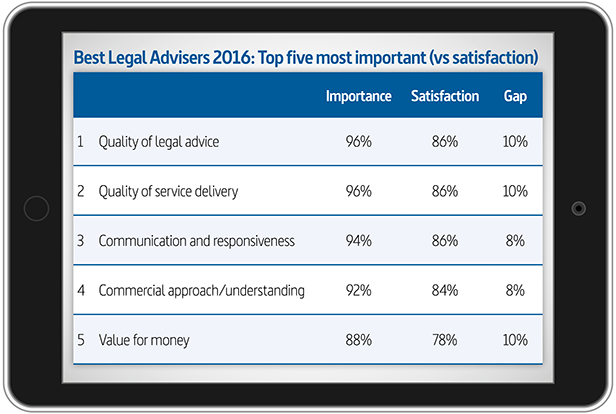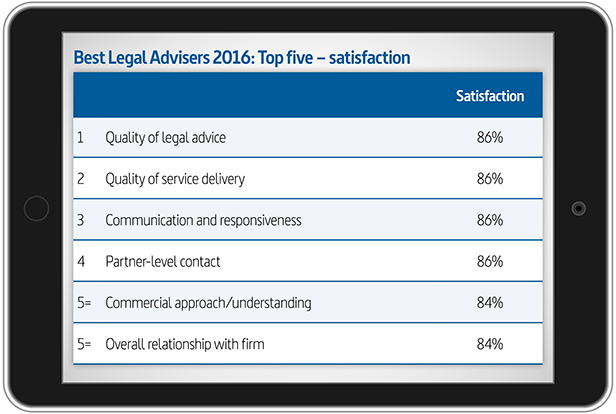Quality of legal advice and quality of service are the most important factors for clients when assessing their external law firms, according to a major new survey of GCs, in-house lawyers and senior executives.
The finding is just one of many conclusions drawn from this year’s Legal Week Intelligence Best Legal Advisers Report 2016-17, which canvassed the views of 761 in-house lawyers and senior execs at top UK and international companies
Respondents were asked to rate the importance of – and their satisfaction with – 12 criteria covering all aspects of legal advice provision, including commercial acumen, billing, fee arrangements, relationships, teamwork and innovation.
Quality of legal advice and quality of service came out joint top among all criteria, both scoring 96% in importance, ahead of communication and responsiveness (94%), commercial approach/understanding (92%) and value for money (92%).
However, clients are less satisfied with how law firms are delivering on these criteria, with both quality of legal advice and quality of service scoring 86%. However, among many of the law firms ranked among the top 20 best legal advisers this year, satisfaction levels are notably higher, with scores of well in excess of 90% not uncommon.
How then do they succeed in keeping their clients fully satisfied?  Shepherd and Wedderburn CEO Stephen Gibb (pictured, right) is upfront in providing an explanation: “Our highest ratings in client surveys are in relation to quality of service and quality of advice. We know, because clients tell us, that they value our partner-led relationship approach and our retention rates evidence that we are getting this right. We also know there is no room for complacency. Ongoing engagement and improvement are essential to ensuring that we not only meet but exceed expectations.”
Shepherd and Wedderburn CEO Stephen Gibb (pictured, right) is upfront in providing an explanation: “Our highest ratings in client surveys are in relation to quality of service and quality of advice. We know, because clients tell us, that they value our partner-led relationship approach and our retention rates evidence that we are getting this right. We also know there is no room for complacency. Ongoing engagement and improvement are essential to ensuring that we not only meet but exceed expectations.”
At Travers Smith, managing partner David Patient receives a similar message: “Clients make a choice when they come to any law firm. One thing I regularly hear from clients and other law firms we work with, often on the other side, is just how consistently strong the quality of our team is.”
Of course, not all leading firms share the same breadth of commercial clients or offer the same areas of expertise. “Our clients are generally very sophisticated and dynamic – either big family businesses or complex companies – and we really try and respond to that,” says Kevin Gold, managing partner at Mishcon de Reya. “We have an internal mantra: best is best, and unless we can believe that we are best in a particular area, or one of the best, we won’t do that work.”
James Knight, managing director of Keystone Law, concurs: “Unlike conventional law firms, which focus most of their energy on attracting clients, we have a particular offering that attracts an extremely high calibre of lawyer, and that high calibre of lawyer attracts a high calibre of client.”
 Meanwhile, David Pester, managing partner of TLT (pictured, right), points to “the ability to deliver a consistent service to clients as something that we continue to focus on and improve. That’s partly down to how you train, develop and retain people: we are able to provide a consistent service because there is stability.”
Meanwhile, David Pester, managing partner of TLT (pictured, right), points to “the ability to deliver a consistent service to clients as something that we continue to focus on and improve. That’s partly down to how you train, develop and retain people: we are able to provide a consistent service because there is stability.”
Shoosmiths’ CEO, Claire Rowe, develops the point: “Our growth strategy has always been very much focused around the client; what clients are asking for and what it is we need to add to our offering. With that comes a reflection: it’s all about the talent.”
The human element The next two most important criteria both point to another distinctly human element: communication and responsiveness. This is rated as important by 94% of respondents, with commercial approach and understanding of my business identified by 92%. Again, the satisfaction gap is identical, with a deficiency of 8% in each case – communication at 86% (which is notably much better than last year’s 78%) and understanding at 84% (up from 81%).
Among highly rated firms, these two elements are key.
Pester says: “We’ve looked closely at the way we consistently manage and engage with clients. In a market which is unlikely to grow rapidly, it’s about what kind of relationships you have with clients, the quality of relationships, how much listening is going on, how active that engagement is around suggestions for improvement. It’s about being very close to those for whom ultimately you are providing services.”
Like many of his counterparts, David Pollitt, managing partner at DAC Beachcroft, sees outstanding legal expertise as a given. “We go beyond this,” he says, “working in partnership with our clients. Our deep relationship with them ensures we can give a commercial and relevant view, as well as legal opinion.”
Rowe gets to the crux of the matter: “The client wants teamwork. What they really appreciate is when it doesn’t feel like they are just working with a bunch of lawyers who are there to make their money.”
The cornerstone of what clients expect, says James Miller, head of insurance and reinsurance at RPC, is “listening and then responding”. He explains: “We’ve spent a lot of time getting to the heart of what our clients are looking for. It works at different levels: the level of the firm overall; by practice area; and then, most importantly, the level of the individual relationship. We put significant investment into each relationship.”
 Jonathan Blair, managing partner of Bond Dickinson (pictured, right), also believes that effective interaction is often the key differentiator: “You have got to have exceptional high quality, everyone does, however I don’t think quality itself is enough. It is really what distinguishes you; what distinguishes you is the people you have and the way they deliver the service. It’s fundamentally true that people like to work with people they like. You can be the brightest technician in the world but if a client doesn’t like you, doesn’t enjoy working with you, doesn’t enjoy your style of delivery, you are going to struggle.”
Jonathan Blair, managing partner of Bond Dickinson (pictured, right), also believes that effective interaction is often the key differentiator: “You have got to have exceptional high quality, everyone does, however I don’t think quality itself is enough. It is really what distinguishes you; what distinguishes you is the people you have and the way they deliver the service. It’s fundamentally true that people like to work with people they like. You can be the brightest technician in the world but if a client doesn’t like you, doesn’t enjoy working with you, doesn’t enjoy your style of delivery, you are going to struggle.”
It is a message that chimes with Andrew Leaitherland, managing partner at DWF: “Our focus remains on building strong relationships, anticipating our clients’ needs and changes to their markets, whilst offering contextually and commercially relevant advice and solutions. The way we approach our clients’ business requirements, our ability to think and do things differently, to bring a different level of understanding and insight – this is our stock in trade.”
The search for value Getting good value from law firms sees another gap of 10% between importance and satisfaction: 88% vs 78%. But this figure represents an enormous improvement in satisfaction from last year’s survey, where the comparable figures were 87% vs 63%. The dramatic increase of 15% is borne out in the report commentary, where value is mentioned frequently by clients, albeit grudgingly: “They are extremely good, but they are expensive” summarises a typical view.
However, there is also much praise. One client says of his firm, where advice does not come cheap: “Excellent work at a reasonable price”; while another firm is clearly well regarded: “I feel they value and prioritise my work.” As is a close competitor: “A top level firm who are responsive and deliver value for money: a rare commodity in the City these days.”
The phrase ‘value for money’ appears more frequently: “Very good value for money if you know the right individuals”; “Better value than magic circle”; “They add exceptional value at every stage in the process”; and from one very happy client about his advisers: “They are the best firm in the City: they are extremely good technical lawyers, they know my business and are extremely good value for money.”
Although thinner on the ground, unhappy clients remain quite vocal: “Yet to see value for money from the commercial team”; “The firm needs to provide better value”; “This firm is perceived as expensive and only out for the money”; “They are expensive for the service they provide and not always very responsive.” But overall, it is hard not to conclude that despite these grumbles, the consensus view among general counsel is that their law firms are delivering much better value.
 So how do firms perceive value? “You know you have delivered true value when the client says to you: just send me the bill,” says Blair. “Value means different things to different clients,” suggests Pollitt. “Delivering true value to clients is about understanding, contributing and, in many cases, leading a client’s agenda rather than just reacting to it,” adds Leaitherland (pictured, right). “Dynamic value” is what clients want, adds Knight, which he describes as: “A level of service and value that they are not able to access anywhere else.”
So how do firms perceive value? “You know you have delivered true value when the client says to you: just send me the bill,” says Blair. “Value means different things to different clients,” suggests Pollitt. “Delivering true value to clients is about understanding, contributing and, in many cases, leading a client’s agenda rather than just reacting to it,” adds Leaitherland (pictured, right). “Dynamic value” is what clients want, adds Knight, which he describes as: “A level of service and value that they are not able to access anywhere else.”
Patient offers a strategic view: “Value for money is the whole picture: the client service, the enjoyment of working with the people, the responsiveness, and the quality of the advice, which is taken for granted.” Rowe goes further: “What clients ask for is top quality legal advice at best value, and value is determined according to their own criteria and the particular transaction. Value is also about how you work with that client and that’s about the teamwork… and the investment of time in getting to know the client.”
Gold also sees value as an evolutionary process: “We try and get underneath a client’s skin; for us it’s a privilege to sit by their side. Once we get to know them well, the driver – hopefully we can convince them – is about value rather than price.”
One area that clients regard as being not quite as important (74%), partner-level contact, has a remarkably high satisfaction level (86%). “Partner-level responsiveness is very good,” says one respondent; “Partner-level contact is fantastic,” says another; while a third offers a more cynical take: “Too much partner-led involvement didn’t seem to add any value.”
Opinions can certainly polarise – from “A lot of partner contact and they are willing to go the extra mile to support you, often at no charge, so there’s a lot of added value”; to “Our relationship partner routinely treats us as a third-rate client in terms of response time, presentation, attitude and billing”; and ‘I’m more likely to win the lottery than have some partners return a call.’
Rethinking the model And the biggest challenge for law firms in minding future gaps? Miller responds: “To keep rethinking our own business model so that clients get the right deal and the firm continues to prosper.” Pollitt sees his key challenge as: “One of continual improvement and of investing in every area of our business. The investment required means identifying new efficiencies – in technology and in our legal processes, for example – to ensure we can continue to deliver the value required.”
Pester cautions: “We need to recognise that the size of most legal service providers will impact the extent to which they can invest in testing new technologies before applying them in a real-life context. The alternative approach would be to look at how we collaborate with the large technology providers to bring the value of technological advances more quickly to our clients.”
Blair asks more profound questions about the impact of technology: “How do we connect with the next generation of lawyers? New technological advances, AI in particular, are going to change fundamentally what our business does best. How do we provide structured career paths for that? How do we retain people in that sort of environment? How do we energise and excite so that the business has a future, has a legacy?”
 Gold (pictured, right), who has been managing partner for nearly 20 years, acknowledges that “the single biggest change in the law is the speed and time of everything”. But his greatest challenge remains the same: “From a Mishcon point of view, it is to remain focused on our clients at all times and not to lose that focus. So we must be a client-centric business offering what the client wants and needs, rather than what we think they should have. In this world, you are only as good as your last job.”
Gold (pictured, right), who has been managing partner for nearly 20 years, acknowledges that “the single biggest change in the law is the speed and time of everything”. But his greatest challenge remains the same: “From a Mishcon point of view, it is to remain focused on our clients at all times and not to lose that focus. So we must be a client-centric business offering what the client wants and needs, rather than what we think they should have. In this world, you are only as good as your last job.”
 The Best Legal Advisers Report will be published in December. For more information email [email protected] or call her on +44 (0) 203 868 7545
The Best Legal Advisers Report will be published in December. For more information email [email protected] or call her on +44 (0) 203 868 7545
Click on the links below to read profiles of this year’s Best Legal Advisers:
- Best Legal Advisers 2016: Shoosmiths
- Best Legal Advisers 2016: Bond Dickinson
- Best Legal Advisers 2016: RPC
- Best Legal Advisers 2016: DAC Beachcroft
- Best Legal Advisers 2016: DWF
- Best Legal Advisers 2016: Keystone Law
- Best Legal Advisers 2016: Mishcon de Reya
- Best Legal Advisers 2016: Shepherd and Wedderburn
- Best Legal Advisers 2016: TLT
NOT FOR REPRINT
© 2024 ALM Global, LLC, All Rights Reserved. Request academic re-use from www.copyright.com. All other uses, submit a request to [email protected]. For more information visit Asset & Logo Licensing.











